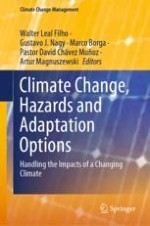2020 | OriginalPaper | Buchkapitel
Post-cyclone Aila and Mobility Rights of the Shora Muslim Women of the Bangladesh Sundarbans Forest
verfasst von : Sajal Roy
Erschienen in: Climate Change, Hazards and Adaptation Options
Aktivieren Sie unsere intelligente Suche, um passende Fachinhalte oder Patente zu finden.
Wählen Sie Textabschnitte aus um mit Künstlicher Intelligenz passenden Patente zu finden. powered by
Markieren Sie Textabschnitte, um KI-gestützt weitere passende Inhalte zu finden. powered by
